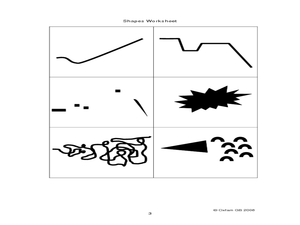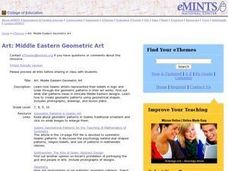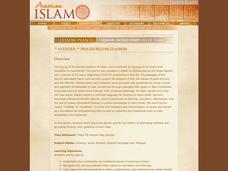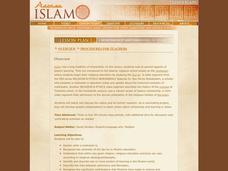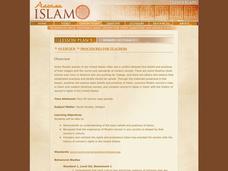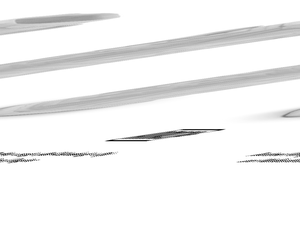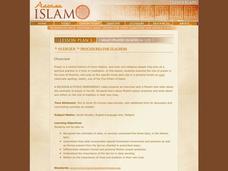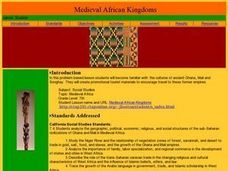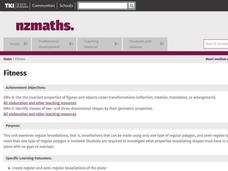Metropolitan Museum of Art
Islamic Art and Geometric Design
After an overview of Islamic traditions and art, young artists create their own geometric shapes and patterns using only a straightedge and a compass.
Curated OER
Global Music Patterns- Islamic Art
Students compose music using Islamic patterns. In this cultural arts lesson, students examine Islamic art and analyze the patterns. Students incorporate various Islamic patterns into a musical composition.
Curated OER
Middle Eastern Geometric Art
Young scholars examine how Islamic artists represented their beliefs in logic and order through the geometric patterns in their art works. They analyze star patterns in Middle Eastern designs, and create geometric patterns using...
Curated OER
Middle-East Reflections
Practice symmetry and patterns with this Mid-Eastern art project. Your class will create beautiful, reflective mosaics that will brighten up the classroom! A list of necessary materials is included.
Curated OER
Ceramics and Patterns with Islamic Roots and the Effect on Christian Europe
Students examine a variety of ceramic pieces and trace their route through China into Europe. As a class, they discuss how ideas and patterns were carried along with the art itself. To end the lesson, they write a report on the...
Curated OER
Qur'an: Sacred Scripture of Islam
Students discover the strong emphasis Islam puts on education. Using the Internet, they identify advancements in ethics, math and astronomy. They explain the importance of madrasahs, or traditional places of learning in Islam, and...
Curated OER
Scholarship and Learning in Islam
Students explain what a madrasah represents in Islam. Using the Muslim world as an example, they identify and describe two or more centers of learning. They explain the contributions that Muslims have made to science and math and...
National Endowment for the Humanities
Arabic Poetry: Guzzle a Ghazal!
Learners research the evolution and cultural significance of the Arabic ghazal form of poetry. They, in groups, compose an original ghazal poem and read it aloud to the class.
Curated OER
Creating with Clay
Students are introduced to the Art Museum's Ahambra Vase. They explore the difference between throwing on the pottery wheel and hand building. Students create a functional vessel using two of the three hand-building techniques. They find...
Curated OER
Women In Islam
Students identify the basic beliefs and practices within Islam. Using a specific country's culture, they discover the experiences of Muslim women differ between countries. They compare and contrast the rights and protections Islam...
Curated OER
Doorways/Printmaking
Students are introduced to the techniques used in printmaking along with the relief method and tessellation relationships to art. In groups, they examine a variety of architecture used throughout the Islamic culture. To end the lesson,...
Curated OER
Influential People Taking A Stand
Seventh graders explore how influential people have taken a stand on difficult issues and the consequences that followed. This lesson connect American studens with students in England who present their own person for exploration.
Curated OER
Religion and the First Amendment
Students examine the tenets of the First Amendment and how it applies to Islam. They observe a video about Islamic prayer and focus on rights, responsibility, and respect in relation to the religion. Students discuss the difference...
Curated OER
Textured Pottery using Self-Hardening Clay and Multicultural Design
Students create textured pottery. In this multicultural arts instructional activity, students follow step-by-step directions to create textured pottery with a multicultural design out of self-hardening clay.
Curated OER
Italian Renaissance
Fifth graders explore the Italian Rensissance in this six lessons unit. The prominent citizens, the ideas, values, art, philosophy, and literature of the are seen as a rediscovery of Ancient Greek and Roman times.
Curated OER
Islam or Christianity?
Students design a mosaic depicting the city of Constantinople during determined periods of history. They include historical evidence that shows whether the city was under Muslim or Christian rule.
Curated OER
Haikus
Students study about Ramadan while discovering the basic Haiku poetry format. Students listen to the story Ramadan, By Suhaib Hamid Ghazi synthesizing what Muslims do during Ramadan.
Curated OER
Inked Geometric Mandalas
Fifth graders gain an appreciation for mandalas in many cultures. Compare and contrast designs from many cultures. They see geometric design in mandalas and become aware of symmetrical balance and radial balance. They create a mandala...
Curated OER
Build a Bargueno
Students create a decorative drawer front concealing student treasures. This be accomplished by exploring the functions of a bargueno (writing desk). The discover how cultural influences impact the artist's motif.
Curated OER
History of World Religions
First graders listen to a variety of Noah's Ark, based on the story in the Old Testament. They hear another "flood story" for comparison.
Curated OER
Salat: Prayer in Muslim Life
Young scholars examine the meaning of prayer and provide their own definitions. They watch a video about Muslim prayer, discuss a fact sheet about it, and break into discussion groups. Students write about their own traditions and...
Curated OER
Grade 5: Testing for Tessellations
Fifth graders use formal geometric language to describe polygons (and other shapes) that will tessellate the plane and those that will not. Students make generalizations about the characteristics of a polygon (or other shape) that will...
Curated OER
Medieval African Kingdoms
Seventh graders examine the geography and political history of West Africa. They role-play as applicants to a company that transports customers to any historic time period. Working in teams, they create promotional products encouraging...
Curated OER
Fitness
Fourth graders determine how to design regular and semi-regular tessellations of the plane. They develop the ability to demonstrate why a tessellation covers the plane in this series of lessons.



